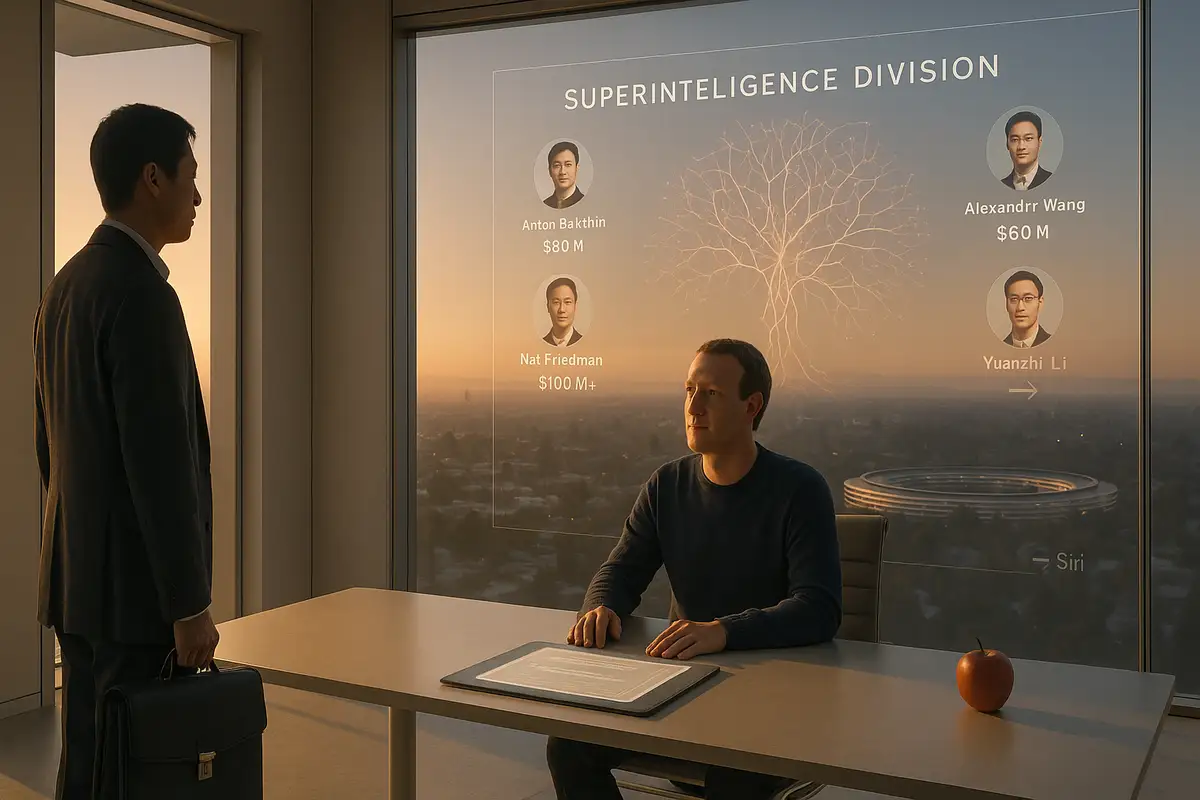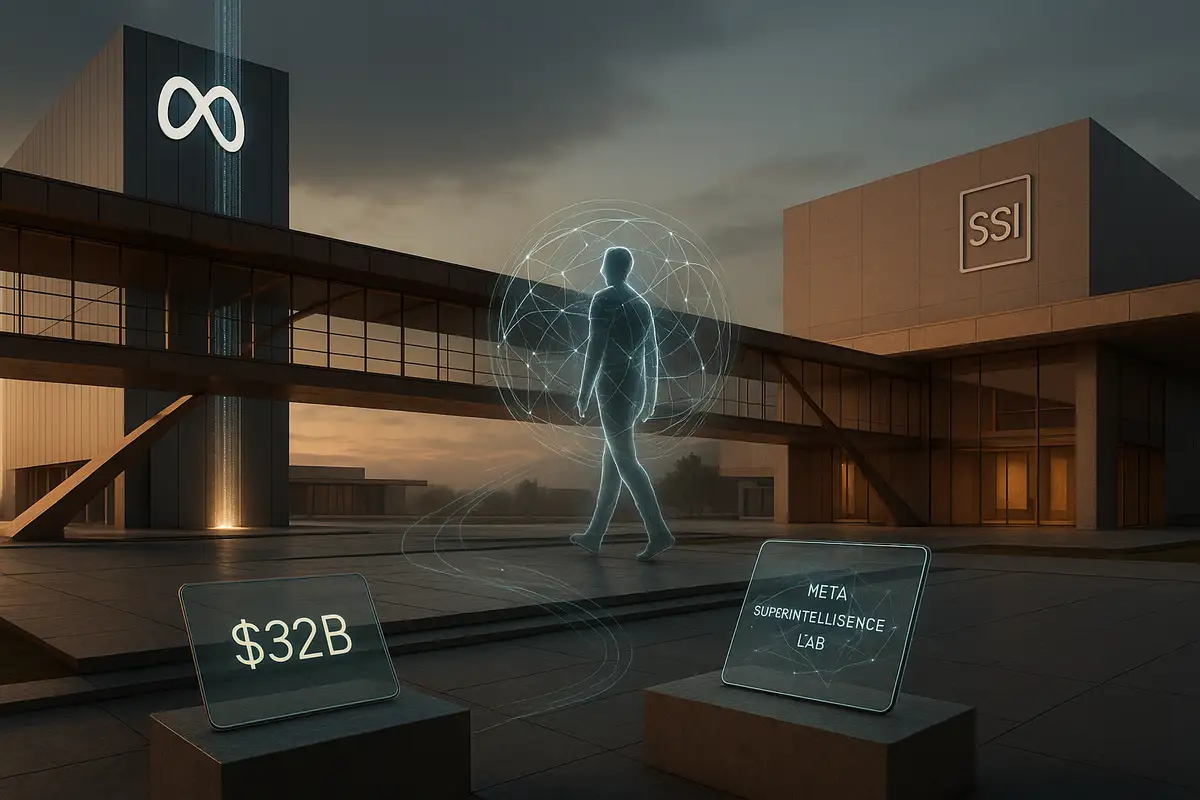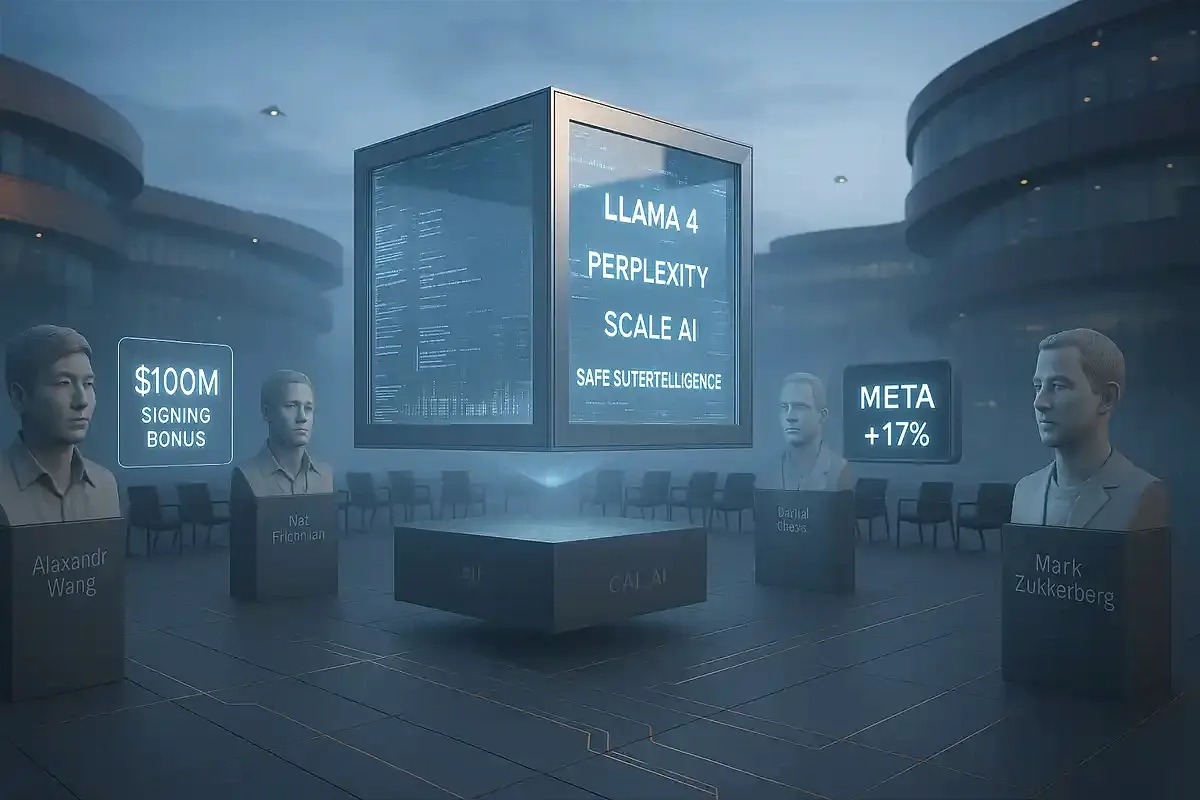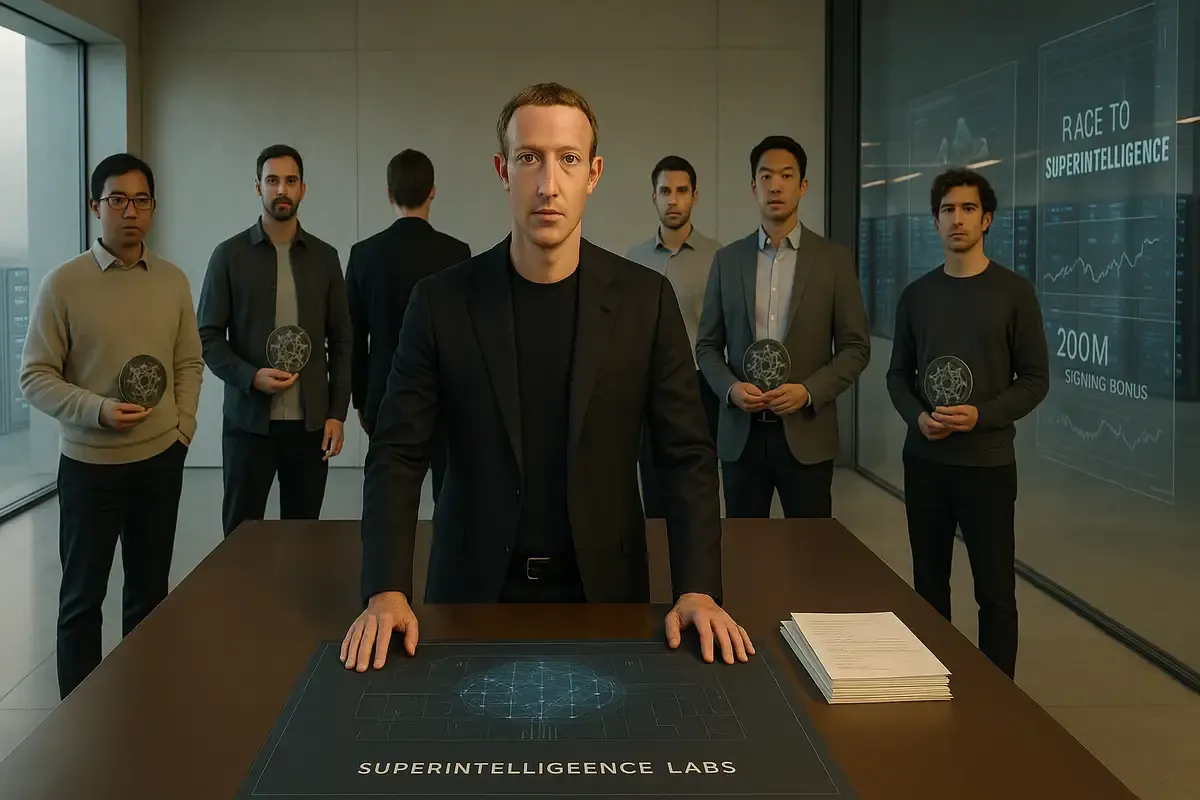💡 TL;DR - The 30 Seconds Version
💰 Meta paid Ruoming Pang over $200 million to leave Apple's AI team, part of packages that exceed CEO salaries at major banks.
📊 Meta's AI models rank 17th on performance leaderboards, yet the company poached more than 10 OpenAI researchers with massive offers.
🏭 Zuckerberg's Superintelligence Labs now includes Scale AI's Alexandr Wang (costing $14.3 billion) and former GitHub chief Nat Friedman.
🌍 Apple didn't match Meta's offer because it exceeded even Tim Cook's compensation, showing how the talent war prices out competitors.
🚀 Meta bets that talent plus computing resources equals breakthrough results, buying the teams that built competitors' models.
⚡ Stock-heavy packages tie payouts to Meta's performance and extended vesting schedules, meaning early departure forfeits millions.
Mark Zuckerberg sent a cold email that changed everything. The Meta CEO reached out directly to AI researchers, offering them roles in his new Superintelligence Labs. The hook? Pay packages worth more than $200 million.
The strategy worked. Ruoming Pang, who ran Apple's AI models team, jumped ship for a compensation package that dwarfs most CEO salaries. Apple didn't even try to match the offer. The number was simply too big, even for a company sitting on a quarter-trillion in cash.
Meta's shopping spree extends far beyond Pang. The company poached leading OpenAI scientist Lucas Beyer, who co-created the vision transformer. It hired Alexandr Wang, Scale AI's former CEO, by taking a 49% stake in his company worth $14.3 billion. Former GitHub chief Nat Friedman and AI startup founder Daniel Gross joined the team too.
The New Math of AI Talent
These aren't ordinary job offers. Meta structures its packages around three parts: base salary, signing bonus, and stock grants. The stock portion carries the biggest weight, tied to specific performance targets like Meta's share price hitting certain growth milestones.
The vesting schedules stretch beyond the typical four-year timeline. New hires agree to longer commitments, with payouts linked to both company performance and personal loyalty. Walk away early, and you leave millions on the table.
OpenAI CEO Sam Altman described the battle in stark terms on a podcast. He said Meta offered his employees signing bonuses as high as $100 million, plus even larger total packages. Altman claimed his people stayed because OpenAI had better culture and innovation credentials.
Despite Altman's confidence, Meta successfully hired more than 10 OpenAI researchers. The company also pulled top talent from Anthropic, Google, and other startups. Money talks, apparently.
The Irony of Meta's Position
Here's the puzzle: Meta currently trails in the AI race it's spending billions to win. The company's Llama models rank 17th on real-time leaderboards. They lag behind Google DeepMind and OpenAI's offerings. They're also more expensive to run.
Yet researchers keep joining. Why? Zuckerberg offers something his competitors can't match: vast computing resources and the promise of being first to cross the superintelligence threshold. AI scientists need massive arrays of powerful chips to train cutting-edge models. Meta delivers that computing power at scale.
The company's open-source commitment also attracts talent. Zuckerberg released Llama models freely, arguing that democratizing AI creates bigger impact. Many researchers believe this approach beats keeping innovations locked behind corporate walls.
OpenAI made similar promises early on, sharing research "for recruitment purposes," according to former chief scientist Ilya Sutskever. Then the company went commercial and closed its doors.
The Psychology of the Race
Money motivates these hires, but it's not the only factor. Many AI researchers are already wealthy. They're driven by something deeper: the desire to be first.
The field resembles cancer research, where scientists want to win the race to a cure as much as they want to find cures at all. AI researchers believe their work will solve climate change, aging, and other big problems. But they also want the glory of crossing the finish line first.
Meta's hiring spree creates momentum. When top scientists see their peers joining Zuckerberg's team, they fear missing out on the breakthrough moment. The company now has what industry insiders call "a statistically higher chance" of building superintelligent AI before anyone else.
The Talent War Escalates
Meta CTO Andrew Bosworth downplayed the recruiting efforts in a recent all-hands meeting. "Sam is just being dishonest here," he said about Altman's claims. "He's suggesting that we're doing this for every single person. The market's hot. It's not that hot."
The numbers suggest otherwise. Pang's $200 million package exceeds compensation for CEOs at major banks. It's among the highest corporate payouts anywhere, for any role.
The talent drain hits competitors hard. Apple lost its foundation models leader and faces potential exits from other team members. The company restructured its AI division under Zhifeng Chen, splitting responsibilities among senior engineers.
Apple's restraint might prove costly. The company famously has massive resources but apparently won't match Meta's offers. Other tech companies face similar pressure as the bidding war intensifies.
The Bigger Bet
Zuckerberg's hiring blitz represents a massive gamble. He's betting that talent alone can overcome Meta's current technical disadvantage. The company's AI models underperform, but its research team now includes some of the field's biggest names.
Investors have questioned this strategy. Why spend billions developing AI models and then give them away for free? The lackluster performance of recent Llama releases adds pressure to consider more commercial approaches.
The race has personal stakes for Zuckerberg too. He likely cares about being first to superintelligence as much as anyone in the field. The prize isn't just bragging rights—it's potentially reshaping how humans work, learn, and live.
Meta's approach contrasts sharply with competitors. Google and OpenAI focus on building better models with existing teams. Meta buys the teams that built those models in the first place.
The Stakes Keep Rising
The AI talent war shows no signs of cooling. As capabilities advance and timelines compress, the pressure to hire top researchers intensifies. Companies worry that falling behind in talent means falling behind in the race to superintelligence.
For individual researchers, the decision comes down to more than money. Where do they have the best shot at building truly intelligent machines? Meta's massive computing resources and open-source philosophy create a compelling case, even if the company currently trails in model performance.
The irony is striking: Meta spends the most but ranks lowest among the major AI players. Zuckerberg's bet assumes that talent plus resources equals breakthrough results. The AI field will soon test whether that math works.
Why this matters:
• Meta's $200 million talent grab shows how desperate Big Tech has become to win the AI race—even companies that are currently losing are spending like they're winning.
• The real competition isn't about who has the best AI models today, but who can hire the people who will build tomorrow's superintelligent systems.
❓ Frequently Asked Questions
Q: How does Meta's $200 million offer compare to normal tech salaries?
A: It's roughly 40 times higher than typical senior engineer packages at major tech companies, which range from $300,000 to $800,000 annually. The $200 million exceeds compensation for CEOs at major banks and ranks among the highest corporate payouts anywhere.
Q: What happens if employees leave Meta before their contracts end?
A: They forfeit most of their compensation. The packages use extended vesting schedules beyond the typical four-year timeline, with stock payouts tied to performance targets like Meta's share price growth. Early departure means leaving millions on the table.
Q: Why is Meta spending billions when their AI models rank 17th on leaderboards?
A: Meta's betting that talent plus computing resources equals breakthrough results. Rather than building better models with existing teams like Google and OpenAI, Meta buys the teams that built those models in the first place.
Q: Are other companies matching Meta's offers?
A: No. Apple didn't try to match Ruoming Pang's $200 million package because it exceeded even CEO Tim Cook's compensation. Most tech companies appear unwilling to enter a bidding war at these levels, despite having the resources.
Q: What exactly is Meta's Superintelligence Labs?
A: It's Meta's new division focused on building AI systems that can complete tasks as well as or better than humans. The team includes former GitHub chief Nat Friedman, Scale AI's Alexandr Wang, and over 10 poached OpenAI researchers.
Q: How much has Meta spent total on AI talent acquisition?
A: At least several billion dollars. Alexandr Wang's hire cost $14.3 billion through a 49% stake in Scale AI. With $200 million packages for researchers like Ruoming Pang and $100 million signing bonuses mentioned by OpenAI's CEO, the total easily exceeds $20 billion.
Q: How do the stock-heavy packages work?
A: Most compensation comes through Meta shares tied to specific performance targets, like the stock growing by certain percentages annually. Base salaries and signing bonuses provide upfront cash, but the bulk depends on Meta's stock performance and employee loyalty.
Q: Why don't AI researchers just start their own companies instead?
A: Building cutting-edge AI requires massive computing resources—huge arrays of expensive AI chips and data centers. Meta provides this infrastructure at scale, plus the chance to be first to superintelligence. Most startups can't match that combination.
















